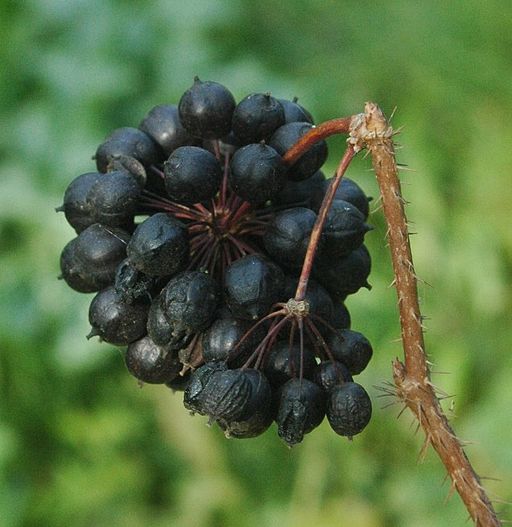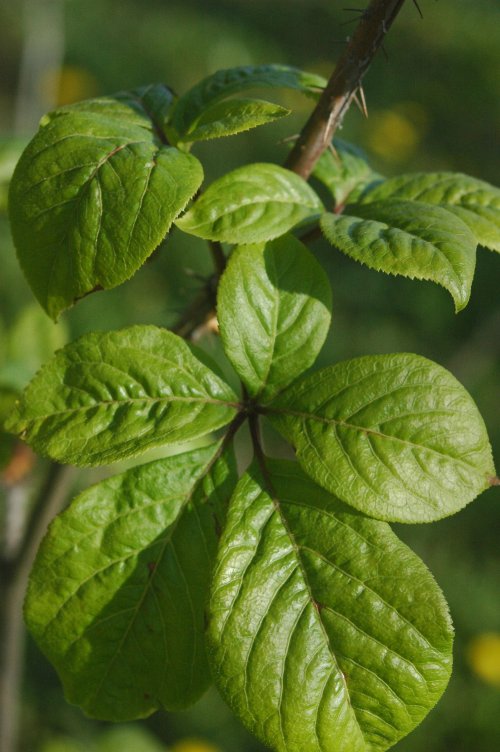 Siberian ginseng (Eleutherococcus senticosus) belongs to the Araliaceae family of plants. Other common names for siberian ginseng include eleuthero ginseng. Siberian ginseng is a small shrub that grows to about 2 meters in height and often forms hedges and thickets in forests. Although Eleutherococcus senticosus is called Siberian ginseng, it belongs to a different genus as Panax ginseng, and so the plants are not closely related. However, the properties of the plant are comparable due to the similarities in the profile of the phytochemicals they contain. Siberian ginseng is native to parts of Asia including China, Japan and Russia, and has been used in traditional medicine for its medicinal properties. In particular Siberian ginseng has a long history of use in Traditional Chinese Medicine. These properties are described as adaptogenic, or stress relieving. In this regard some of the medicinal effects of Siberian ginseng can be thought of as similar to Panax ginseng, withania, brahmi, roseroot, sour date and mimosa.
Siberian ginseng (Eleutherococcus senticosus) belongs to the Araliaceae family of plants. Other common names for siberian ginseng include eleuthero ginseng. Siberian ginseng is a small shrub that grows to about 2 meters in height and often forms hedges and thickets in forests. Although Eleutherococcus senticosus is called Siberian ginseng, it belongs to a different genus as Panax ginseng, and so the plants are not closely related. However, the properties of the plant are comparable due to the similarities in the profile of the phytochemicals they contain. Siberian ginseng is native to parts of Asia including China, Japan and Russia, and has been used in traditional medicine for its medicinal properties. In particular Siberian ginseng has a long history of use in Traditional Chinese Medicine. These properties are described as adaptogenic, or stress relieving. In this regard some of the medicinal effects of Siberian ginseng can be thought of as similar to Panax ginseng, withania, brahmi, roseroot, sour date and mimosa.

Siberian Ginseng (Eleutherococcus senticosus) berries. Image from: By Stanislav Doronenko (Own work)5 (http://creativecommons.org/ licenses/by/2.5)], via Wikimedia Commons.
Siberian ginseng contains a group of chemicals collectively called eleutherosides, which may explain its adaptogenic properties. Eleutheroside A is a steroidal saponins, but other eleutherosides such as eleutheroside B are phenol glucosides, whereas yet other eleutherosides are triterpene saponins. This collection of chemicals is thought to give Siberian ginseng it adaptogenic properties, and is often standardised in extracts to provide a certain level of consistency between extracts. However, the natural eleutheroside content of Siberian ginseng is thought to be around 0.6 to 0.9 %, although this will vary with growing conditions. Siberian ginseng also contains a number of other phytochemicals including phenolic acids such as ferulic acid and caffeic acid, which may confer antioxidant properties on herbal extracts of the plant. The antioxidant nutrients vitamin E and β-carotene are also present in Siberian ginseng.

Siberian Ginseng (Eleutherococcus senticosus) may have adaptogenic properties. These properties may give extracts of Siberian ginseng mood enhancing effects. Image from: By Stanislav Doronenko (Own work)5 (http://creativecommons.org/ licenses/by/2.5)], via Wikimedia Commons.
Because of its adaptogenic properties, Siberian ginseng may have mood elevating effects. Studies have investigated the antidepressant effect of Siberian ginseng on animals. In one study, administration of Siberian ginseng caused significant antidepressant effects in the rats exposed to experimental stress. Other herbs also cause a significant antidepressant effects including roseroot (Rhodiola rosea), echinacea (Echinacea purpurea) and schizandra (Schizandra chinensis). The effects of the herbs were not as great as for the tricyclic antidepressant drug amitriptyline, but were significantly greater than the control group. A number of individual phytochemicals were then investigated for their antidepressant effects in rats and syringin (eleutheroside BIII) from Siberian Ginseng and rosavin from rhodiola were found to be the most effective compounds of those tested. This suggests that Siberian ginseng may confer antidepressant effects though the presence of eleutherosides.
Eat Well, Stay Healthy, Protect Yourself
RdB
